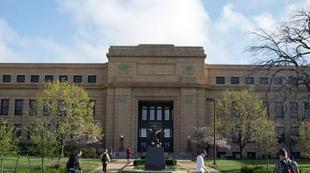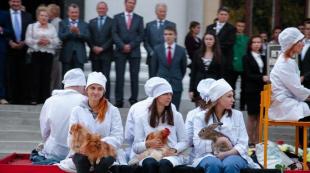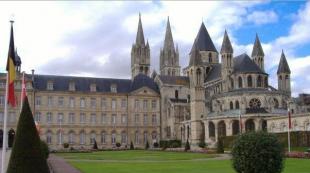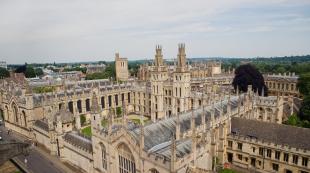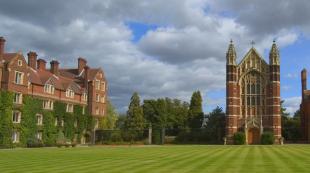The role of the poet Nekrasov. Nekrasov on the appointment of a poet and poetry. Essay on literature on the topic: Nikolai Nekrasov on the appointment of a poet and poetry
N.A.Nekrasov can be deservedly called a revolutionary poet. He was one of the founders of social poetry, for which there are no taboo topics. In his work, Nekrasov pays great attention to the theme of the poet's destiny. He believes that being a poet is a sacred lot, a duty. And the duty is primarily civil. This idea is central to the poem "The Poet and the Citizen". This is where the famous lines come from:
You may not be a poet
But you must be a Citizen.
The citizen furiously convinces the Poet that it is necessary to dedicate
His genius to serve the fatherland:
Go into the fire for the honor of the fatherland,
For beliefs, for love.
Go and perish flawlessly.
You will not die for nothing: the matter is solid,
When blood flows underneath.
This is a direct call for revolution, for rebellion at all costs. But the Poet does not accept this position, he is afraid to “pay with his head”. The muse appears to him less and less, pale and sad. And for a long time fiery speeches are no longer born from the once sharp pen. It is impossible, of course, to identify the author with the Poet. Nekrasov was never afraid to openly express his views.
This poem expresses Nekrasov's desire to put poetry at the service of the people. However, this is felt in all of his creations.
Nekrasov is known as a singer of the common people. He is always ready to intercede for the oppressed, humiliated, suffering Russian peasant. All of his most famous works - "Who Lives Well in Russia", "Frost, Red Nose", "Railway", "Reflections at the Front Entrance" - are dedicated to the hard lot of the Russian people who groan in mines, at construction sites, in prisons, at the front porches and in their own crumbling houses. "Peasant happiness" is a purely speculative concept that does not exist in real life. Nekrasov asks for his native land:
"Give me a monastery wherever a Russian peasant moans."
And he himself answers that there is not a single corner on earth where the common people would not be oppressed. Perfectly aware of this, Nekrasov believes that his only and most true purpose is to tirelessly talk about this and call for the destruction of old foundations, the construction of a bright future. For these seditious ideas, censorship often forbade the publication of Nekrasov's works. Nevertheless, sooner or later they were published anyway and were well received by both critics and the general public. Belinsky highly appreciated the work of Nekrasov and called him a true poet.
N. A. Nekrasov ponders a lot about his own Muse. For him, this is not at all a beautiful fairy with wings behind her back and a harp, fluttering and tuning into a lyrical mood. No, for Nekrasov it is “The Muse of Revenge and Sorrow”. Her head is adorned with a “crown of thorns”. She is sad and at the same time merciless. She alone is the intercessor of the weak, the disadvantaged and the denouncer of the oppressors. Sensing the imminence of death, the poet turns precisely to his Muse, tortured and pale. He says he was honest with himself and others and never betrayed his inspiration.
The image of the Muse in Nekrasov's poetry is invariably intertwined with the image of a Russian peasant woman. The poet again and again turned to this image dear to his heart. He is especially vividly captured in the poem "Frost, Red Nose". Daria, a simple Russian woman, is impeccably beautiful in every way. She is patient, hardy, hardworking, strong in spirit. She has no equal in work or fun. She is proud but not arrogant. Smart, but taciturn. She is also good in appearance, attracts many eyes, but at the same time remains a faithful and devoted wife. Here is the true "type of stately Slavic woman" who is so dear to Nekrasov.
This is also, to some extent, the poet's duty - not to let this vivid image fade, to revive it on the pages of books.
Nekrasov, thus, reflecting on the poet's destiny, expresses love for the people in his poems, declaring that the goal of creativity is the struggle for the future, when the Russian people will no longer suffer under an unbearable yoke. How can a poet fight? Only by the power of your genius, your word. Who inspires him to fight? "Muse of revenge and sorrow."
In one of the last poems, Nekrasov speaks very clearly about the purpose of his work, to which he devoted his whole life:
I was called to sing of your suffering,
Patience amazing people!
And throw a single ray of consciousness
On the path that God leads you ...
The poet dreamed of sowing, albeit rare, seeds of enlightenment on the people's soil. It is not for nothing that in several of his poems the image of a sower appears before us. For Nekrasov, this is a symbol of an enlightener, a person who sows knowledge. Alas, the poet is well aware that he will not be able to see whether these seeds will sprout (“It's a pity - neither me nor you will have to live in this wonderful time”). But the hope that this wonderful time will come sooner or later does not leave the author and helps him to create. Nekrasov sincerely cares for the Russian people. And the best thing he can do is write tirelessly about him, protesting against his oppressors. In Nekrasov's understanding, this is the highest destiny of the poet and poetry.
You read at once: N.A.Nekrasov on the appointment of the poet and poetry
N.A.Nekrasov can be deservedly called a revolutionary poet. He was one of the founders of social poetry, for which there are no taboo topics. In his work, Nekrasov pays great attention to the theme of the poet's destiny. He believes that being a poet is a sacred lot, a duty. And the duty is primarily civil. This idea is central to the poem "The Poet and the Citizen". This is where the famous lines come from:
You may not be a poet
But you must be a Citizen.
The citizen furiously convinces the Poet that he needs to devote his genius to serving the fatherland:
Go into the fire for the honor of the fatherland,
For beliefs, for love.
Go and perish flawlessly.
You will not die for nothing: the matter is solid,
When blood flows underneath.
This is a direct call for revolution, for rebellion at all costs. But the Poet does not accept this position, he is afraid to “pay with his head”. The muse appears to him less and less, pale and sad. And for a long time fiery speeches are no longer born from the once sharp pen. It is impossible, of course, to identify the author with the Poet. Nekrasov was never afraid to openly express his views.
This poem expresses the desire of Nekrasov to put poetry at the service of the people. However, this is felt in all of his creations.
Nekrasov is known as a singer of the common people. He is always ready to intercede for the oppressed, humiliated, suffering Russian peasant. All of his most famous works - "Who Lives Well in Russia", "Frost, Red Nose", "Railway", "Reflections at the Front Entrance" - are dedicated to the hard lot of the Russian people who groan in mines, at construction sites, in prisons, at the front porches and in their own crumbling houses. "Peasant happiness" is a purely speculative concept that does not exist in real life. Nekrasov asks for his native land:
"Give me a monastery wherever a Russian peasant moans."
And he himself answers that there is not a single corner on earth where the common people would not be oppressed. Perfectly aware of this, Nekrasov believes that his only and most true purpose is to tirelessly talk about this and call for the destruction of old foundations, the construction of a bright future. For these seditious ideas, censorship often forbade the publication of Nekrasov's works. Nevertheless, sooner or later they were published anyway and were well received by both critics and the general public. Belinsky highly appreciated the work of Nekrasov and called him a true poet.
N. A. Nekrasov ponders a lot about his own Muse. For him, this is not at all a beautiful fairy with wings behind her back and a harp, fluttering and tuning in a lyrical mood. No, for Nekrasov it is “The Muse of Revenge and Sorrow”. Her head is adorned with a “crown of thorns”. She is sad and at the same time merciless. She alone is the intercessor of the weak, the disadvantaged and the denouncer of the oppressors. Sensing the imminence of death, the poet turns precisely to his Muse, tortured and pale. He says he was honest with himself and others and never betrayed his inspiration.
The image of the Muse in Nekrasov's poetry is invariably intertwined with the image of a Russian peasant woman. The poet again and again turned to this image dear to his heart. He is especially vividly captured in the poem "Frost, Red Nose". Daria, a simple Russian woman, is impeccably beautiful in every way. She is patient, hardy, hardworking, strong in spirit. She has no equal in work or fun. She is proud but not arrogant. Smart, but taciturn. She is also good in appearance, attracts many eyes, but at the same time remains a faithful and devoted wife. Here is the true "type of stately Slav", which is so dear to Nekrasov.
This is also, to some extent, the poet's duty - not to let this vivid image fade, to revive it on the pages of books.
Nekrasov, thus, reflecting on the poet's destiny, expresses love for the people in his poems, declaring that the goal of creativity is the struggle for the future, when the Russian people will no longer suffer under an unbearable yoke. How can a poet fight? Only by the power of your genius, your word. Who inspires him to fight? "Muse of revenge and sorrow."
In one of the last poems, Nekrasov speaks very clearly about the purpose of his work, to which he devoted his whole life:
I was called to sing of your suffering,
Patience amazing people!
And throw a single ray of consciousness
On the path that God leads you ...
The poet dreamed of sowing, albeit rare, seeds of enlightenment on the people's soil. It is not for nothing that in several of his poems the image of a sower appears before us. For Nekrasov, this is a symbol of an enlightener, a person who sows knowledge. Alas, the poet is well aware that he will not be able to see whether these seeds will sprout (“It's a pity - neither I nor you will have to live in this wonderful time”). But the hope that this wonderful time will come sooner or later does not leave the author and helps him to create. Nekrasov sincerely cares for the Russian people. And the best thing he can do is write tirelessly about him, protesting against his oppressors. In Nekrasov's understanding, this is the highest destiny of the poet and poetry.
Bibliography
For the preparation of this work were used materials from the site coolsoch.ru/
N. L. Nekrasov on the appointment of the poet and poetry
NL Nekrasov can deservedly be called a poet-revolutionary. He believes that being a poet is a sacred lot, a duty. And the duty is primarily civil. "The Poet and the Citizen".
You may not be a poet
But you must be a citizen,
The citizen furiously convinces the Poet that he needs to devote his genius to serving the Fatherland. But the Poet does not accept this position, he is afraid to “pay with his head”. The muse appears to him less and less, pale and sad. And for a long time no more fiery speeches flow from under the once sharp pen. It is impossible, of course, to identify the author with the Poet. Nekrasov was never afraid to openly express his views.
This poem shows the desire of Nekrasov to put poetry at the service of the people.
Nekrasov is known as a singer of the common people. He is always ready to put in a word for the oppressed, humiliated Russian peasant. All of his most famous works - "Who Lives Well in Russia", "Frost, Red Nose", "Railway", "Reflections at the Front Entrance" - are dedicated to the hard lot of the Russian people who groan in mines, at construction sites, in prisons, at the front porches and in their own crumbling houses. "Peasant happiness" is a purely speculative concept, which does not exist in faeal life. Nekrasov asks: "Tell me such a monastery where a Russian peasant would not moan?" And he himself answers that there is not a single corner on earth where the common people would not be oppressed. Nekrasov believes that his only and surest mission is to talk about this tirelessly and call for the destruction of the old foundations. For these seditious ideas, the censorship constantly forbade the publication of Nekrasov's works. Nevertheless, sooner or later they were published anyway and were well received by both critics and the general public. Belinsky highly appreciated the work of Nekrasov and called him a true poet.
N.A.Nekrasov ponders a lot about his own Muse. For him, this is not a beautiful fairy, fluttering and tuning in a lyrical mood. No, for Nekrasov it is "The Muse of Revenge and Sorrow." Her head is adorned with a crown of thorns. She is sad and at the same time merciless. She alone is the intercessor of the weak, the disadvantaged and the denouncer of the oppressors.
Sensing the imminence of death, the poet turns precisely to his Muse, tortured and pale. He says he was honest with himself and others and never betrayed his inspiration.
The image of the Muse in Nekrasov's poetry is invariably intertwined with the image of a Russian peasant woman. The poet again and again turned to this image dear to his heart. He is especially vividly captured in the poem "Frost, Red Nose". Daria, a simple Russian woman, is impeccably beautiful in every way. She is patient, hardy, hardworking, strong in spirit. She has no equal in work or fun. She is proud but not arrogant. Smart, but taciturn. She is also good in appearance, attracts many eyes, but at the same time remains a faithful and devoted wife. Here is the true "type of stately Slav", which is so dear to Nekrasov.
It is also, to some extent, the poet's duty - not to let this vivid image fade, to resurrect it on the pages of books.
Nekrasov's work, therefore, has three main directions: the purpose of the poet, reflections on the Muse and great love for the people. Nevertheless, these directions are closely intertwined and lead to one goal. This goal is to fight for the future, when the Russian people will no longer suffer under an unbearable yoke. How can a poet fight? Only by the power of your genius, your word. Who inspires him to fight? "Muse of honor and sorrow".
Nekrasov himself, in one of his last poems, speaks very clearly of his purpose, to which he devoted his whole life:
I was called to sing of your suffering,
Patience amazing people!
And throw a single ray of consciousness
On the path that God leads you ...
The poet dreamed of sowing at least rare seeds of enlightenment on the people's soil. It is not for nothing that in several of his poems the image of a sower appears before us. For Nekrasov, this is a symbol of an enlightener, a person who sows knowledge. Alas, the poet is well aware that he will not be able to see whether these seeds will sprout (“It's a pity - neither I, pi you, will have to live in this wonderful time”). But the hope that this wonderful time will come sooner or later does not leave the author and helps him to create.
Nekrasov sincerely cares for the Russian people. And the best thing he can do is write tirelessly about it, expressing his protest against the oppressors. In Nekrasov's understanding, this is the highest destiny of the poet and poetry.
N.A.Nekrasov can be deservedly called a revolutionary poet. He believes that being a poet is a sacred lot, a duty. And the duty is primarily civil. “The Poet and the Citizen”.
You may not be a poet
But you must be a citizen.
The citizen furiously convinces the Poet that he needs to devote his genius to serving the Fatherland. But the Poet does not accept this position, he is afraid to “pay with his head”. The muse appears to him less and less, pale and sad. And for a long time no more fiery speeches flow from under the once sharp pen. It is impossible, of course, to identify the author with the Poet. Nekrasov was never afraid to openly express his views.
This poem shows the desire of Nekrasov to put poetry at the service of the people.
Nekrasov is known as a singer of the common people. He is always ready to put in a good word for the oppressed, humiliated Russian peasant. All of his most famous works - "Who Lives Well in Russia", "Frost, Red Nose", "Railroad", "Reflections at the Front Entrance" - are dedicated to the hard lot of the Russian people who groan in mines, construction sites, in prisons, at the front porches and in their own crumbling houses. "Peasant happiness" is a purely speculative concept that does not exist in real life. Nekrasov asks: "Tell me a monastery where a Russian peasant would not moan?" And he himself answers that there is not a single corner on earth where the common people would not be oppressed. Nekrasov believes that his only and surest mission is to talk tirelessly about this and call for the destruction of the old foundations. For these seditious ideas, the censorship constantly forbade the publication of Nekrasov's works. Nevertheless, sooner or later they were published anyway and were well received by both critics and the general public. Belinsky highly appreciated the work of Nekrasov and called him a true poet.
N. A. Nekrasov ponders a lot about his own Muse. For him, this is not a beautiful fairy, fluttering and tuning in a lyrical mood. No, for Nekrasov it is “The Muse of Revenge and Sorrow”. Her head is adorned with a “crown of thorns”. She is sad and at the same time merciless. She alone is the intercessor of the weak, the disadvantaged and the denouncer of the oppressors.
Sensing the imminence of death, the poet turns precisely to his Muse, tortured and pale. He says he was honest with himself and others and never betrayed his inspiration.
The image of the Muse in Nekrasov's poetry is invariably intertwined with the image of a Russian peasant woman. The poet again and again turned to this image dear to his heart. He is especially vividly captured in the poem "Frost, Red Nose". Daria, a simple Russian woman, is impeccably beautiful in every way. She is patient, hardy, hardworking, strong in spirit. She has no equal pi in work, pi in fun. She is proud but not arrogant. Smart, but taciturn. She is also good in appearance, attracts many eyes, but at the same time remains a faithful and devoted wife. Here is the true "type of stately Slavic woman" who is so dear to Nekrasov.
This is also, to some extent, the poet's duty - not to let this vivid image fade, to revive it on the pages of books. Nekrasov's work, therefore, has three main directions: the purpose of the poet, reflections on the Muse and great love for the people. Nevertheless, these directions are closely intertwined and lead to one goal. This goal is to fight for the future, when the Russian people will no longer suffer under an unbearable yoke. How can a poet fight? Only by the power of your genius, your word. Who inspires him to fight? "Muse of revenge and sorrow."
Nekrasov himself, in one of his last poems, spoke very clearly of his purpose, to which he devoted his whole life:
I was called to sing of your suffering,
Patience, an amazing guy!
And throw a single ray of consciousness
On the path that God leads you ...
The poet dreamed of sowing at least rare seeds of enlightenment on the people's soil. It is not for nothing that in several of his poems the image of a sower appears before us. For Nekrasov, this is a symbol of an enlightener, a person who sows knowledge. Alas, the poet is well aware that he will not be able to see if these seeds will sprout (“It's a pity - neither me nor you will have to live in this wonderful time”). But the hope that this wonderful time will come sooner or later does not leave the author and helps him to create.
Nekrasov sincerely cares for the Russian people. And the best thing he can do is write tirelessly about it, expressing his protest against the oppressors. In Nekrasov's understanding, this is the highest destiny of the poet and poetry.
Essay on literature on the topic: Nikolai Nekrasov on the appointment of a poet and poetry
Other compositions:
- N.A.Nekrasov can be deservedly called a revolutionary poet. He was one of the founders of social poetry, for which there are no taboo topics. In his work, Nekrasov pays great attention to the theme of the poet's destiny. He believes that being a poet is a sacred lot, a duty. And Read More ......
- The theme of the poet's destiny and poetry is traditional for Russian literature. It can be traced in the works of Derzhavin, Kuchelbecker, Ryleev, Pushkin, Lermontov. Nekrasov is no exception. Kuchelbecker was the first, before Pushkin and Lermontov, to call the poet a prophet. The position of a prophet obliged the poet to be above the crowd in the struggle Read More ......
- The theme of the poet's destiny and poetry is traditional for Russian literature. It can be traced in the works of Derzhavin, Kuchelbecker, Ryleev, Pushkin, Lermontov. Nekrasov is no exception. Nekrasov pays great attention to the purpose of the poet and poetry, their role in the life of society. Kuchelbecker first before Pushkin and Read More ......
- The theme of the poet, his destiny and destiny occupies an important place in the works of the classics of Russian literature A.S. Pushkin and M.Yu. Lermontov. Throughout their lives, they have been thinking about this problem, and therefore the image of a poet, a poet, is not Read More ......
- One of greatest poets XIX century, we can safely name Mikhail Yuryevich Lermontov. Many people learn his poems by heart, for some he is a favorite poet. It would seem that we all know about him: life, creativity, ideals, principles. Is this so on Read More ......
- Vladimir Mayakovsky very seriously and responsibly approached poetry in general and his work in particular. The author spoke energetically and figuratively about his mission to serve people. Mayakovsky compared the activities of the poet with the work of a miner and miner. Poetry - The same Read More ......
- Always shine, shine everywhere, until the last days of the bottom, shine - and no nails! This is my slogan - and the sun! V. V. Mayakovsky Following A. S. Pushkin, M. Yu. Lermontov and N. A. Nekrasov, Vladimir Mayakovsky approached very seriously and responsibly Read More ......
- And we know that it has always been this way: That we love more by fate, Who lives by the laws of others, And who dies young. He does not remember the word “yes” and the word “no.” He does not remember any ranks or names. And is able to reach the stars, Read More ......
Feb 09 2014
NA Nekrasov can deservedly be called a revolutionary poet. He was one of the founders of social poetry, for which there are no taboo topics. In his, Nekrasov pays great attention to the theme of the poet's destiny. He believes that being a poet is a sacred lot, a duty. And the duty is primarily civil.
This idea is central to the poem "The Poet and the Citizen". This is where the famous lines come from: You may not be a poet, But you must be a citizen. The citizen furiously convinces the Poet that copying is prohibited 2005 to devote his genius to serving the fatherland: Go into the fire for the honor of the fatherland, for beliefs, for love. Go and perish flawlessly. You will die for good reason: the case is solid, When blood flows under it. This is a direct call for revolution, for rebellion at all costs. But he does not accept this position, he Fears"Pay with your head."
The muse appears to him less and less, pale and sad. And for a long time fiery speeches are no longer born from the once sharp pen. It is impossible, of course, to identify the author with the Poet. Nekrasov was never afraid to openly express his views.
This poem expresses the desire of Nekrasov to put poetry at the service of the people. However, this is felt in all of his creations. Nekrasov is known as a singer of the common people. He is always ready to intercede for the oppressed, humiliated, suffering Russian peasant. All of his most famous works - "Who Lives Well in Russia", "Frost, Red Nose", "Railway", "Reflections at the Front Entrance" - are dedicated to the hard lot of the Russian people who groan in mines, at construction sites, in prisons, at the front porches and in their own crumbling houses.
"Peasant happiness" is a purely speculative concept that does not exist in real life. Nekrasov asks for his native land: "Give me a monastery wherever a Russian peasant moans." And he himself answers that there is not a single corner on earth where the common people would not be oppressed. Perfectly aware of this, Nekrasov believes that his only and most true purpose is to tirelessly talk about this and call for the destruction of old foundations, the construction of a bright future.
For these seditious ideas, censorship often forbade the publication of Nekrasov's works. Nevertheless, sooner or later they were published anyway and were well received by both critics and the general public. Belinsky highly appreciated Nekrasov and called him a true poet. N. A. Nekrasov ponders a lot about his own Muse. For him, this is not at all a beautiful fairy with wings behind her back and a harp, fluttering and tuning in a lyrical mood. No, for Nekrasov it is “The Muse of Revenge and Sorrow”.
Her head is adorned with a “crown of thorns”. She is sad and at the same time merciless. She alone is the intercessor of the weak, the disadvantaged and the denouncer of the oppressors.
Sensing the imminence of death, the poet turns precisely to his Muse, tortured and pale. He says he was honest with himself and others and never betrayed his inspiration. Muses in Nekrasov's poetry are invariably intertwined with the image of a Russian peasant woman. The poet again and again turned to this image dear to his heart.
He is especially vividly captured in the poem "Frost, Red Nose". Daria, a simple Russian woman, is impeccably beautiful in every way. She is patient, hardy, hardworking, strong in spirit. She has no equal in work or fun. She is proud but not arrogant.
Smart, but taciturn. She is also good in appearance, attracts many eyes, but at the same time remains a faithful and devoted wife. Here is the true "type of stately Slavic woman" who is so dear to Nekrasov.
This is also, to some extent, the poet's duty - not to let this vivid image fade, to revive it on the pages of books. Nekrasov, thus, reflecting on the poet's destiny, expresses love for the people in his poems, declaring that the goal of creativity is the struggle for the future, when the Russian people will no longer suffer under an unbearable yoke. How can a poet fight? Only by the power of your genius, your word. Who inspires him to fight?
"Muse of revenge and sorrow." In one of the last poems, Nekrasov speaks very clearly about the purpose of his work, to which he devoted his whole life: I was called to praise your suffering, Patience amazing people! And throw at least a single ray of consciousness On the path that God leads you ... The poet dreamed of sowing, albeit rare, seeds of enlightenment on the people's soil. It is not for nothing that in several of his poems the image of a sower appears before us. For Nekrasov, this is a symbol of an enlightener, a person who sows knowledge. Alas, the poet is well aware that he will not be able to see whether these seeds will sprout (“It's a pity - neither I nor you will have to live in this wonderful time”).
But the hope that this wonderful time will come sooner or later does not leave the author and helps him to create. Nekrasov sincerely cares for the Russian people. And the best thing he can do is write tirelessly about him, protesting against his oppressors.
In Nekrasov's understanding, this is the highest destiny of the poet and poetry.
Need a cheat sheet? Then save - "N. A. Nekrasov on the appointment of the poet and poetry. Literary works!


